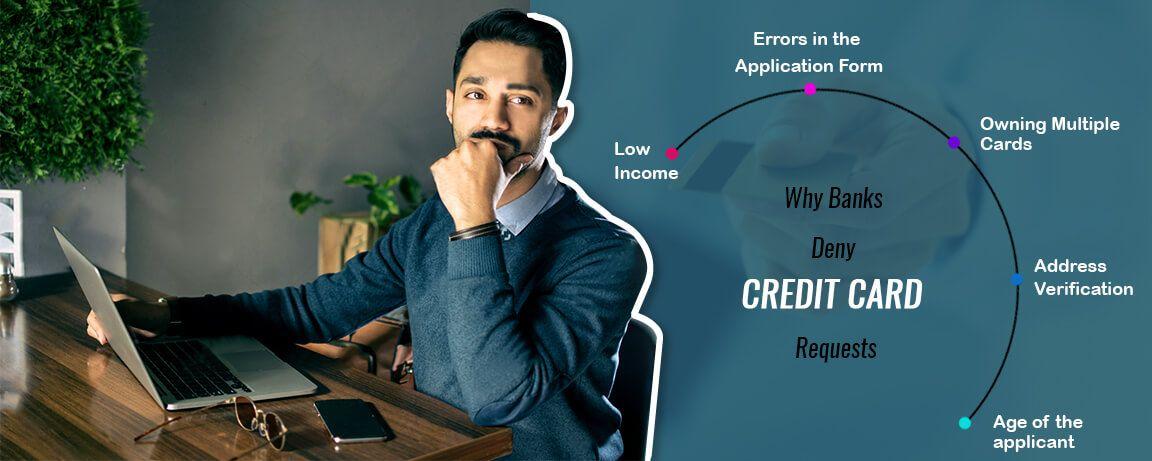5 Reasons Why Banks Deny Credit Card Requests
Credits Cards are fast becoming an integral part of the everyday lives of individuals across the board, and not without reason. With the government promoting a cashless economy, a larger number of people are getting attracted to this financial instrument which not only allows cashless payments but also helps one to purchase now and pay at a later date.
Apparently, this buzz for the cashless economy along with the sheer convenience of using credit card has resulted in a significant increase in Credit Card applications. While most applications get accepted by banks, some are turned down. In such a case, your bank will notify you for the cause of rejection of your Card.
Of course, you wouldn’t want to wait for that unfortunate letter, only to know that the cause of rejection was easily avoidable. It is for this very reason that we are bringing to you the top reasons for which your bank may deny your Credit Card application. This information will come handy in helping you choose the best Credit Cards in India.
Excessively High Loan Balances
While having one loan under your name will not do any harm to your Credit Card application, having multiple loans certainly can. Numerous loans or an excessively high Debt to Income Ratio may lead the bank to believe that you are credit hungry, and possibly an irresponsible borrower, and hence they may shy away from accepting your Credit Card application.
A simple way to avoid this from happening is paying off as much loan amount as possible before you go ahead to Apply for a Credit Card.
Existing Card Balance
If you already own one or more Credit Cards and have a rather high outstanding balance, your bank may view it as reckless financial management. Considering this as a red flag, the bank may turn down your application.
Similarly, if your Credit Utilization Ratio or CUR is higher than 50%, or exhausted several times in the past, the bank may not be eager to approve your Credit Card application.
To avoid this situation, you must ensure that your Credit Card balances are as low as possible, and preferably NIL before you apply for a new card. Besides, it is considered to be a healthy financial habit of keeping your Credit Utilization Ratio to 30% or less, as it reflects efficient management of your personal finances.
Frequent Inquiries on Credit Report
Every time you apply for a Credit Card, or any other loan, the bank or the lender checks your Credit Score, and each of these checks gets recorded in your Credit History. If there are frequent credit inquiries on your Credit Report, the bank will eventually decline your request.
A simple way to avert this situation is to time your credit inquiries with at least a 4-month gap. The lower the number of inquiries, the better will be your chances for getting approved.
Low Income Levels
Every Credit Card provider, such as SBI Credit Cards, enlists some basic requirements that an applicant must meet in order to be eligible. One such requirement is the minimum monthly income. If your income doesn’t meet the given guidelines, your application might get rejected. The tricky part here is that while a vast majority of Credit Card providers explicitly state the minimum income levels, a few don’t. Hence, in such cases, it becomes your onus to determine which Credit Card suits your income level.
As a Pro Tip, you can judge the required income level for a particular Credit card by analyzing its annual fee. For Cards with Nil annual fee, your income can be as low as Rs. 15,000 per month; if the annual fee for the Card is up to Rs. 1,000, you may be required to clock in at least Rs. 25,000 to Rs. 50,000 a month. If the fee is higher than Rs. 1,000, and it is a premium credit card, it may warrant an even higher monthly income.
Recent Collection or Public Record
When you fail to repay your Credit Card debt or service any of your existing loans for over 3 to 6 months, the lender may send you a notice regarding your impending payments. If you still fail to make the necessary payments, the lender will consider it as a default on your end, which will then be registered on your Credit Report. In some cases, the lender may also resort to getting the assistance of collection agents to recover the outstanding balances. As you may guess, such a record raises a red flag, as it reflects your inability to fulfill your financial obligations. More so, when such a record is rather recent, it leads to a rejection of a Credit Card request.
Hence, before you apply for a Credit Card, make sure that you do not have a public record or a loan default in the past 6-12 months. This will significantly improve your chances of getting an approval on your Credit Card application.
Cutting a long story short, before applying for a new Credit Card, pull out your Credit Report and analyse the score. If the score seems to be too low, or the report reflects negligent financial behaviour on your end, try to make improvements, consistently over a period of at least 4-6 months. As you build a good history, you can go ahead and apply for the chosen credit card with confidence.
Also Read: How to Convert HDFC, SBI & ICICI Credit Card Purchases to EMI?
To apply online forBest Credit Cards in India, Secured Loans and Unsecured Loans, visit mymoneymantra, the leading online lending marketplace that offers financial products from 90+ Banks and NBFCs. We have served 7 million+ happy customers since 1989.

